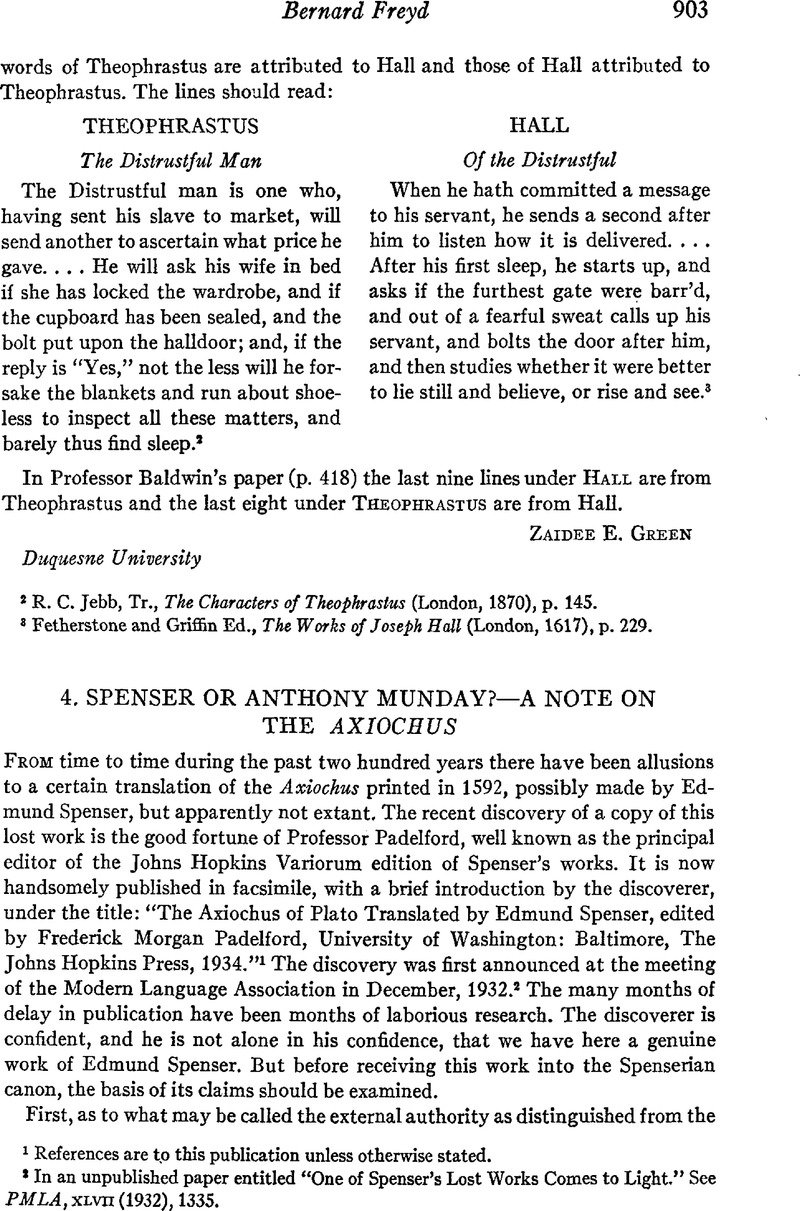No CrossRef data available.
Article contents
Spenser or Anthony Munday?—A Note on The Axiochus
Published online by Cambridge University Press: 02 December 2020
Abstract

- Type
- Comment and Criticism
- Information
- Copyright
- Copyright © Modern Language Association of America, 1935
References
1 References are to this publication unless otherwise stated.
2 In an unpublished paper entitled “One of Spenser's Lost Works Comes to Light.” See PMLA, xlvii (1932), 1335.
3 In H. J. Todd's edition of The Works of Edmund Spenser (1805), i, clxxxiii, in the list of “Imitations of Spenser,” appears the following entry: “A [pretended] New Canto of Spencer's Fairy Queen. Now first published. 4to. Lond. 1747. Mr. Upton is stated to be the author, in Lockyer Davis's Catalogue, 1783, p. 242. I think it very probable. … The Notes also bespeak the hand of Upton.”
4 In this connection it may be noted that Padelford labors under some confusion in saying (p. 16) that in the sixteenth century “by most scholars it [the Axiochus] was attributed to Plato, although its authenticity was already being questioned.” The fact is that the spuriousness of this dialogue has always been unquestioned.
5 E. Legouis, Spenser, p. 134: “He has none of Lyly's euphuism.”
6 See A. E. Taylor, Plato, The Man and his Work (1929), pp. 550–552: “The dialogue is a piece of anti-Epicurean polemic, intended to contrast the Platonic with the Epicurean answer to the perennial question What may I hope for? and to insinuate that the ‘wisdom’ of Epicurus is not even original. It is a mere revival of the ideas of a second-rate sophist, and a ‘doctrine of despair’ into the bargain. … I see no need to suppose a date later than the time of Epicurus, whose Greek is much of the same stamp.”
7 Reference Guide to Edmund Spenser, p. 129.
8 Celeste Turner, “Anthony Mundy: An Elizabethan Man of Letters,” Univ. of California Publ. in Eng., ii, pp. 152–168.
9 Ibid., p. 25–26.
10 Ibid., p. 208.
11 Pollard and Redgrave, Short-Title Catalogue, 1926, p. 468.
12 Turner, pp. 90–92.
13 “Perfect in the Greek tongue” is the well-known phrase of Lodowick Bryskett's Discourse of Civili Life.
14 See E. G. Harman, Edmund Spenser and the Impersonations of Francis Bacon (London, 1914). Particular reference is made to pp. 133–142, 170, 191, 223, 330–332, 389–390, 492–494, 499–501, 529–566. Carpenter (op. cit., p. 264) tersely comments, “A mad world, my masters!”
15 M. St. Clare Byrne, in The Library (June, 1932), p. 32.
16 In Zelauto, 1580. See Turner, op. cit., p. 29–30.
17 “Anthony Munday's Spelling as a Literary Clue,” The Library (1923). Accompanying this article is a commendation from no less an authority than A. W. Pollard.
18 The following errata have been noted: P. vii, last line, “Records” should be “Record.” P. 1, line 13, “etc.,” should be “&c.” P. 2, line 6, “five” should be “eight”; and line 8, put comma after “added.” P. 3, line 9, “man wise (1553)” should be “wise man (1533).” P. 4, line 30, and P. 5, line 19, “Records” should be “Record.” P. 10, line 12, put comma after “Oration.” P. 11, line 17, “Woods” should be “Wood's”; line 24, put comma after “Archaeologia”; line 28, put comma after “street”; line 29, delete comma after “benefaction”; and line 32, “the” should be “an.” P. 12, line 2, “Life 3” should be “Life, iii.” P. 13, line 12, “Phillippe” should be “Philippe.” P. 16, line 17, “Bilibaldus” should be “Wilibaldus.” P. 18, line 18, “& also” should be “and also.” P. 27, line 28, “having” should be “hauing.” P. 28, line 25, “That man is” should be “Than man, is”; line 29, “reach” should be “reache”; and line 30, “youthfull” should be “youthful.” P. 63, line 4, “Cynosargus” should be “Cynosarges”; and line 5, “took” should be “tooke.” P. 64, last line, “Cynosargus” should be “Cynosarges.”


